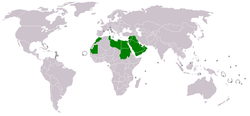ESCWA
| United Nations Economic and Social Commission for Western Asia | |
 |
|

Map showing member states of United Nations Economic and Social Commission for Western Asia`
|
|
| Abbreviation | ESCWA |
|---|---|
| Formation | August 9, 1973 |
| Type | Primary Organ - Regional Branch |
| Legal status | Active |
| Headquarters | Beirut, Lebanon |
|
Head
|
Executive Secretary of ESCWA
|
|
Parent organization
|
ECOSOC |
| Website | ESCWA Website |
Executive Secretary of ESCWA
The United Nations Economic and Social Commission for West Asia (ESCWA) [Arabic]: (الإسكوا), headquartered in Beirut, Lebanon, is one of five regional commissions under the administrative direction of the United Nations Economic and Social Council. ESCWA promotes economic and social development of Western Asia through regional and subregional cooperation and integration. It devises, promotes, and executes development assistance activities and projects in tune with the needs and priorities of the region of Western Asia. ESCWA coordinates its activities with those of the major departments/offices of the United Nations at Headquarters and of specialized agencies and intergovernmental organizations, such as the League of Arab States, the Gulf Cooperation Council and the Organisation of Islamic Cooperation, with a view to avoid duplication and ensure complementarity, synergy and exchange of information. ESCWA has 18 member states (the latest countries to join were Mauritania in 2015; Libya, Morocco and Tunisia in 2012), and reports to the UN Economic and Social Council (ECOSOC).
Vision
In harmony with the universal ideals of the United Nations, ESCWA aspires to induce positive Economic and Social change for lasting development in the Arab region.
ESCWA works in partnership with the governments of the region and inspires citizens to harness their inherent potential to build a solid foundation for progress and prosperity.
Objectives
To support economic and social development in the countries of the region;
To promote cooperation between the countries of the region;
To encourage interaction between member countries and promote the exchange of experience, best practice and lessons learned;
To achieve regional integration between member countries, and to ensure interaction between Western Asia and other regions of the world;
To familiarize the outside world with the circumstances and needs of the countries in the region.
...
Wikipedia
